2023 Economic Editor in Chief Meeting: Editor in Chief Lecture Series (3): The successful presentation of the lecture by the editor in chief of the Journal of Political Economy, the top journal of economics
On June 23, 2023, from 21:00 to 23:00 Beijing time, Professor John List, the editor-in-chief of the Journal of Political Economy and Microeconomics, two of the five major economic journals, delivered an online academic lecture titled "Using Field Experiments in Partnership with Firms to Understand the World." This lecture marks the third session of the second module of the 2023 face-to-face meeting of chief editors of economics, titled "Chief Editors' Series of Special Lectures." The event is hosted by the School of Economics and Management at Beijing Jiaotong University and co-organized by Elsevier Group and the Forum of Economic Management House. The special lecture was conducted via a Zoom online conference and simultaneously broadcasted on two major platforms: Elsevier Video account and service account, and Management Home live streaming. Professor Wang Yacan from the School of Economics and Management at Beijing Jiaotong University hosted the third lecture, with Professor Yi Junjian and Professor Meng Juanjuan from Peking University serving as specially invited guest reviewers. The total number of attendees surpassed 11,239, with 191 participants in the Zoom conference room, 8,054 attendees from Elsevier, and 2,994 attendees from the Management Home.
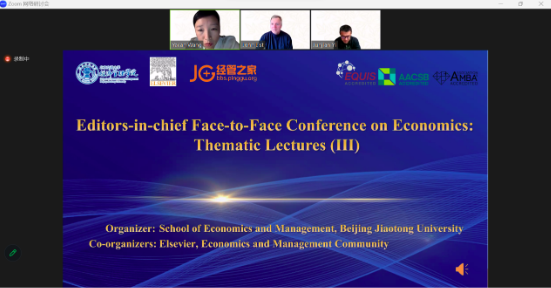
Special Lecture Opening by the Editor in Chief of the Journal of Political Economy
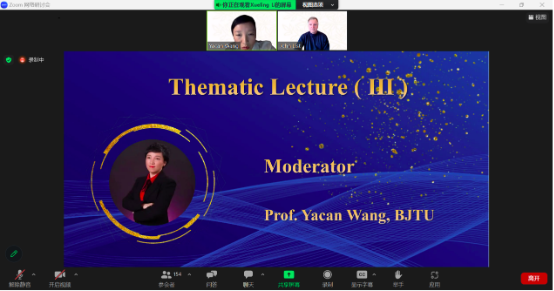
Presided over by Professor Wang Yacan from the School of Economics and Management at Beijing Jiaotong University
John List, the editor-in-chief of the Journal of Political Economy, holds the distinguished position of Kenneth C. Griffin Professor of Service Economics at the University of Chicago. Additionally, he is the founder and co-director of the TMW Center for Early Education+Public Health, serving as the first chief economist of Wal-Mart and formerly holding the chief economist positions at Uber and Lyft. Elected as a member of the American Academy of Arts and Sciences in 2011 and the Econometric Society in 2015, Professor John List has earned recognition for his significant contributions. His extensive research in microeconomics is characterized by a focus on utilizing field experiments to address empirical and normative challenges. Over the years, Professor List's experimental investigations have centered on issues pertaining to the internal workings of markets, the impact of diverse incentive structures on market equilibrium and distribution, the augmentation of standard economic models through behavioral economics, early childhood education and intervention, and the gender income gap in the gig economy. Widely regarded as a pioneer in the innovative application of field experiments to examine both macro and micro problems, he boasts a publication record of over 200 papers in peer-reviewed journals and has authored several bestselling books.
Professor John List has received acclaim as one of the "Top 50 Innovators" by the non-profit Times in 2015 and 2016, specifically for his contributions to charitable donations. Serving on the White House Council of Economic Advisers from 2002 to 2003, he currently holds positions as a researcher at the National Bureau of Economic Research, a senior researcher at the Labor Research Institute, and a director of the Future Resources Institute.
In this lecture, Professor John List shared his noteworthy research on the theme of "Using Field Experiments in Partnership with Firms to Understand the World." The presentation covered three primary aspects of his field experimental collaborations with enterprises: the behavioral foundation of the law of demand, time value considerations, and the economics of criminal behavior.
Regarding the behavioral foundation of the law of demand, Professor John List detailed a natural field experiment conducted in collaboration with the American ride-hailing company Lyft. The study aimed to investigate the impact of repricing carpooling and taxi services based on consumers' "left deviation" on corporate profits. The findings revealed that when Lyft adopted a left deviation pricing strategy, it could increase profits by approximately $160 million per year.
In the realm of time value, Professor John List underscored the significance of time value in economic modeling and its application in U.S. policies. Through two natural field experiments, he estimated the time value of American Lyft users. The results indicated that the time value estimated through field experiments significantly surpassed the values outlined in federal guidelines in the United States. Furthermore, variations were observed among different users, with higher time value typically noted during peak commuting hours, in high-income areas, and under other specific circumstances.
In the field of criminal economics, Professor John List delved into an examination of potential racial discrimination in police handling of speeding cases. Leveraging Lyft user driving data and Florida administrative data, the research revealed no racial differences in speeding behavior, accidents, and recidivism rates. However, both fixed effects and dual machine learning methods unveiled that police were more likely to intercept and penalize minority drivers compared to their white counterparts.
Additionally, Professor John List briefly introduced his field experimental research addressing external issues, such as the gender income gap, work flexibility, and learning while doing from within the company.
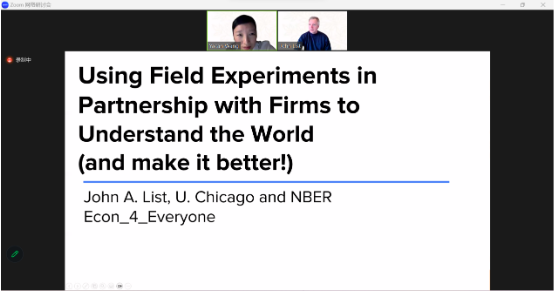
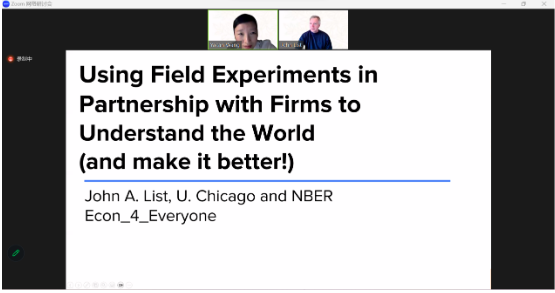
Professor John List shares the latest research findings
Professors Yi Junjian and Meng Juanjuan from Peking University provided insightful commentary on Professor John List's research. Professor Yi Junjian initiated his comments by summarizing the integration of natural field experiments and enterprise big data from four dimensions: theory, effect identification, validation, and welfare analysis, based on the research results presented by Professor John List. Subsequently, he highlighted the progress made in the field experiments in China over the past decades, spanning various areas of economics, including behavior, healthcare, education, development, and the digital economy. Professor Yi Junjian concluded his remarks by offering his vision for the future of field experiments in China, emphasizing the importance of providing educational and training support for the younger generation of economists to engage in scientific research through field experiments.
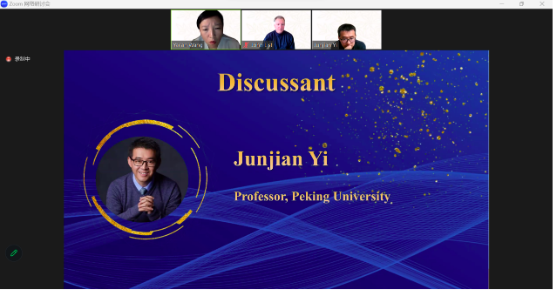
Professor Yi Junjian's Exciting Comments from Peking University
It appears that Professor Meng Juanjuan from Peking University found Professor John List's field experimental research collaboration with Lyft to be a valuable example of utilizing enterprise and field experimental data for analyzing significant economic and social issues. The use of regression methods, structural regression, and machine learning in testing effectiveness was highlighted. Professor Meng Juanjuan then engaged in discussions with Professor John List, addressing thoughts, questions, and findings from the research. The exchange covered topics such as welfare analysis, enterprise motivation in conducting field experiments, factors influencing time value, racial differences in punishment avoidance, and suggestions for collaboration with companies throughout various stages of research. This dialogue provided a platform for in-depth exchanges and discussions among commenting guests, scholars, and young researchers in attendance.
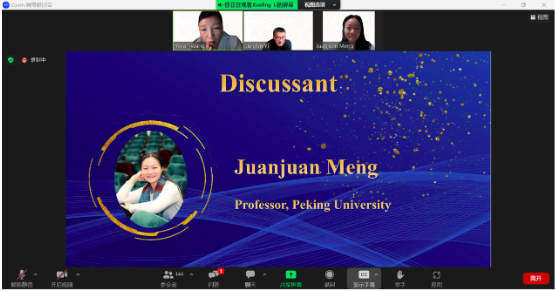
Professor Meng Juanjuan's Wonderful Commentary on Peking University
It sounds like Professor John List's lecture on "Collaborating with Enterprises to Conduct Field Experiments" was quite insightful and provided valuable guidance for attendees. The in-depth discussions with invited reviewers, Professor Yi Junjian and Professor Meng Juanjuan, further enriched the understanding of field experimental research, broadening the thinking dimension for participants involved in related research and collaborations with enterprises. The Q&A session allowed for thorough exchanges and discussions, enhancing methodological support and practical tools for addressing China's economic and social issues through field experiments. This special lecture seems to have successfully facilitated the exchange of ideas and experiences among scholars, contributing to the advancement of field experimental methods in the context of China's economic landscape.












